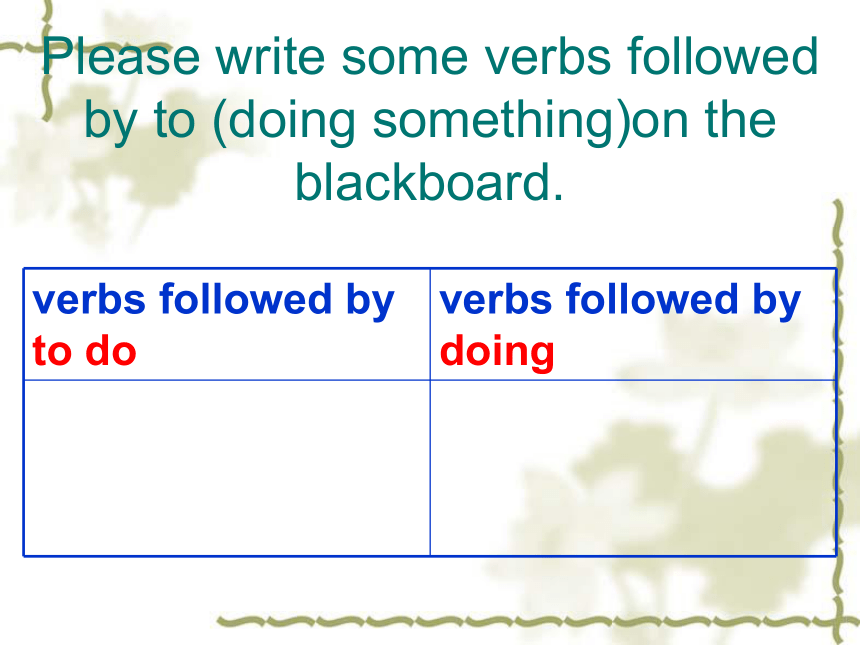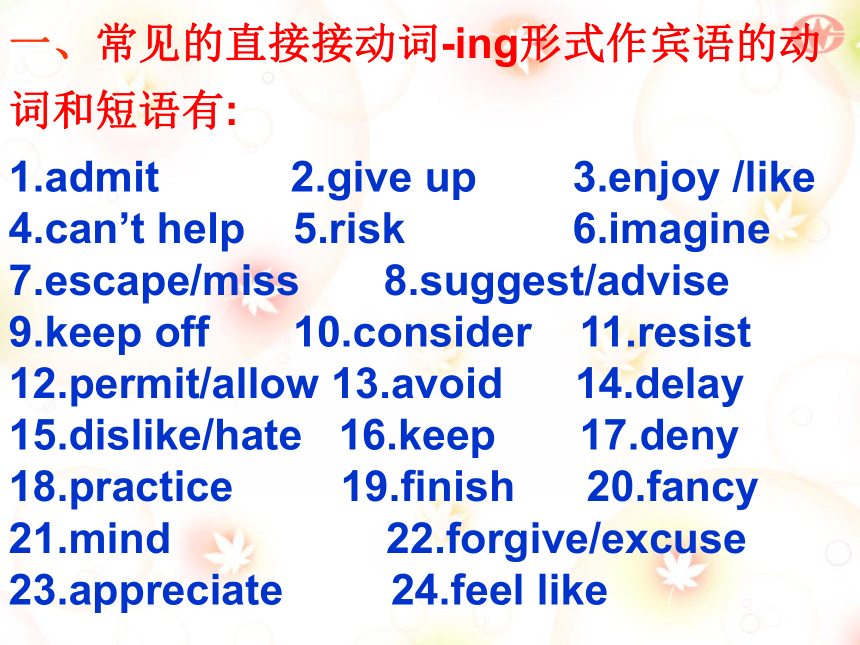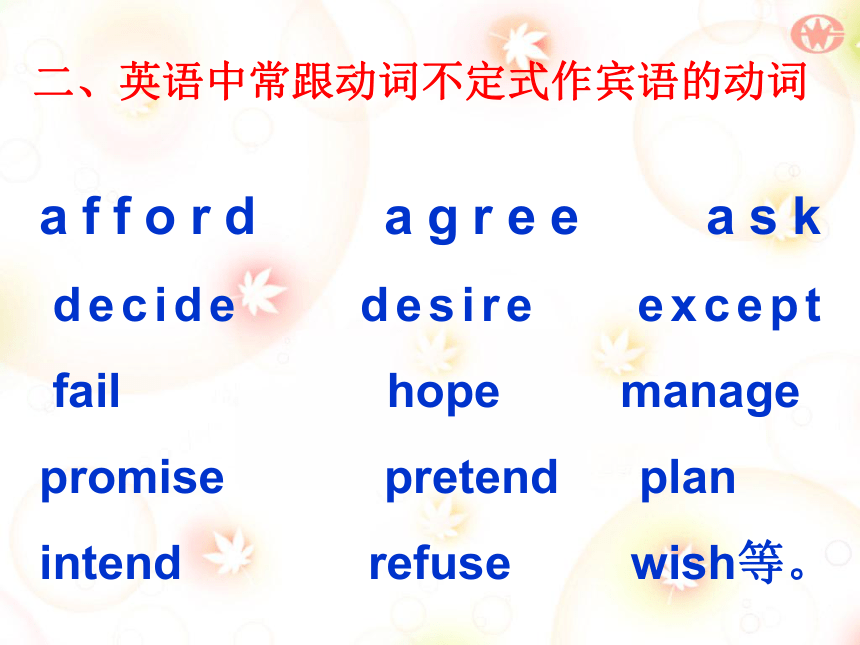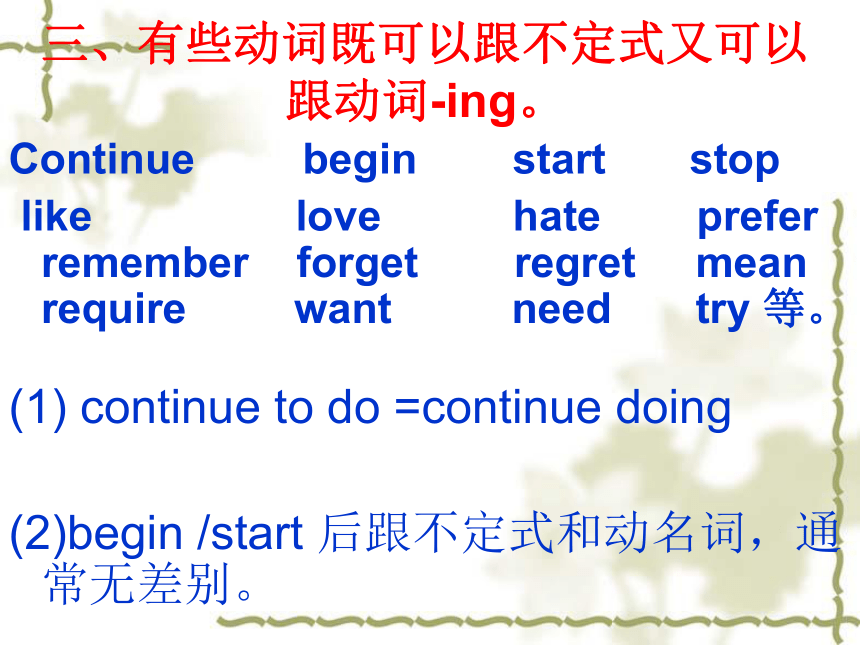Module 3 Adventure in Literature and the Cinema Grammar 课件(17张PPT)
文档属性
| 名称 | Module 3 Adventure in Literature and the Cinema Grammar 课件(17张PPT) |  | |
| 格式 | zip | ||
| 文件大小 | 381.8KB | ||
| 资源类型 | 教案 | ||
| 版本资源 | 外研版 | ||
| 科目 | 英语 | ||
| 更新时间 | 2019-08-16 18:13:05 | ||
图片预览







文档简介
课件17张PPT。 Grammar
Verbs followed
by –ing and to do
Please look at the blackboard. What do you notice about the verbs?1. I really enjoyed working on the farm.
2. He agrees to go.
3. She finished listening to the news.
4. She doesn’t want to go to school this morning.
5. I remember seeing you somewhere in Beijing.
我记得在北京什么地方见到过你。
6. Do you remember to post the letter?
你记住寄这封信了吗?Please write some verbs followed by to (doing something)on the blackboard.一、常见的直接接动词-ing形式作宾语的动词和短语有:1.admit 2.give up 3.enjoy /like
4.can’t help 5.risk 6.imagine 7.escape/miss 8.suggest/advise
9.keep off 10.consider 11.resist 12.permit/allow 13.avoid 14.delay 15.dislike/hate 16.keep 17.deny
18.practice 19.finish 20.fancy 21.mind 22.forgive/excuse 23.appreciate 24.feel like二、英语中常跟动词不定式作宾语的动词 afford agree ask
decide desire except
fail hope manage promise pretend plan
intend refuse wish等。三、有些动词既可以跟不定式又可以跟动词-ing。Continue begin start stop
like love hate prefer remember forget regret mean require want need try 等。
(1) continue to do =continue doing
(2)begin /start 后跟不定式和动名词,通常无差别。(3)like / love/ hate/ dislike /prefer 后跟两种形式时意思差别不大,但当表示通常的一种倾向或正在发生的事情时其后多跟-ing形式。当表示某一特定行为或还未发生的行为时,其后多接to do 形式。(4)stop/ remember / forget / regret /try/ mean 后跟两种形式时意思有很大差别,具体如下:remember to do sth. 记住要做某事
remember doing sth. 记住已做过某事
forget to do sth. 忘记要做某事
forget doing sth. 忘记已做过某事
regret to do sth. 对将要做或正在说的事感到遗憾
regret doing sth. 后悔已做过某事try to do sth. 设法去做某事
try doing sth. 尝试做某事
stop to do sth. 停下来以做另一件事
stop doing sth. 停止做某事
mean to do sth. 意欲/打算做某事
mean doing sth. 意味着做某事
(5)need /require /want 表示“需要”之意时,后跟动名词的主动形式,等于其后跟不定式的被动形式。Discussion Now discuss how to master them in groups.
First. According to these verbs I made up an interesting passage. 我承认我不能放弃我所喜欢的人,上课时我情不自禁的冒险想象我们的未来,但是没逃过老师的法眼,老师建议我推迟考虑,抵制诱惑,并不允许此类事件的再次发生,避免耽误上课时间。我不喜欢老师所说的话,并保持否认。课后,我的练习没有完成,想不到老师不介意,并且原谅了我。我非常感激他,我知道我现在想要的是什么。ExerciseCorrect error
1.Most of the students enjoy to read novels.
2. He always refuses doing what he is unwilling to.
3. You need to practice to speak in English to make progress.
4. He decided leaving for Beijing. 1. — When did you go to the States?
— I remember _____ there when I was
ten.
A.? having taken B. to be taken
C. being taken D. to take
2. He is so busy that he can’t help _____
the classroom.
A. cleaning B. to cleaning
C. to clean D. cleaned
3. As a young man from a rich family, can
you imagine ____ in such a small and
dirty place?
A. to work B. yourself to work
C. working D. work
4. In some parts of London, missing a bus
means________ for another hour.
A. waiting B. to wait
C. wait D. to be waiting
5. My uncle is considering ______ his heath.
A. improve B. to improve
C. improving D. to be improved
6. We should keep ________ English
every day.
A.? to practise speaking
B. practise speaking
C. practising speaking
D. practising to speak 7. He got well-prepared for the job
interview, for he couldn’t risk
_______ the good opportunity.
A. to lose B. losing
C. to be lost D. being lost
8. She was so angry that she felt like
______ something at him.
A. to throw B. to have thrown
C. throwing D. having thrownThank you
Verbs followed
by –ing and to do
Please look at the blackboard. What do you notice about the verbs?1. I really enjoyed working on the farm.
2. He agrees to go.
3. She finished listening to the news.
4. She doesn’t want to go to school this morning.
5. I remember seeing you somewhere in Beijing.
我记得在北京什么地方见到过你。
6. Do you remember to post the letter?
你记住寄这封信了吗?Please write some verbs followed by to (doing something)on the blackboard.一、常见的直接接动词-ing形式作宾语的动词和短语有:1.admit 2.give up 3.enjoy /like
4.can’t help 5.risk 6.imagine 7.escape/miss 8.suggest/advise
9.keep off 10.consider 11.resist 12.permit/allow 13.avoid 14.delay 15.dislike/hate 16.keep 17.deny
18.practice 19.finish 20.fancy 21.mind 22.forgive/excuse 23.appreciate 24.feel like二、英语中常跟动词不定式作宾语的动词 afford agree ask
decide desire except
fail hope manage promise pretend plan
intend refuse wish等。三、有些动词既可以跟不定式又可以跟动词-ing。Continue begin start stop
like love hate prefer remember forget regret mean require want need try 等。
(1) continue to do =continue doing
(2)begin /start 后跟不定式和动名词,通常无差别。(3)like / love/ hate/ dislike /prefer 后跟两种形式时意思差别不大,但当表示通常的一种倾向或正在发生的事情时其后多跟-ing形式。当表示某一特定行为或还未发生的行为时,其后多接to do 形式。(4)stop/ remember / forget / regret /try/ mean 后跟两种形式时意思有很大差别,具体如下:remember to do sth. 记住要做某事
remember doing sth. 记住已做过某事
forget to do sth. 忘记要做某事
forget doing sth. 忘记已做过某事
regret to do sth. 对将要做或正在说的事感到遗憾
regret doing sth. 后悔已做过某事try to do sth. 设法去做某事
try doing sth. 尝试做某事
stop to do sth. 停下来以做另一件事
stop doing sth. 停止做某事
mean to do sth. 意欲/打算做某事
mean doing sth. 意味着做某事
(5)need /require /want 表示“需要”之意时,后跟动名词的主动形式,等于其后跟不定式的被动形式。Discussion Now discuss how to master them in groups.
First. According to these verbs I made up an interesting passage. 我承认我不能放弃我所喜欢的人,上课时我情不自禁的冒险想象我们的未来,但是没逃过老师的法眼,老师建议我推迟考虑,抵制诱惑,并不允许此类事件的再次发生,避免耽误上课时间。我不喜欢老师所说的话,并保持否认。课后,我的练习没有完成,想不到老师不介意,并且原谅了我。我非常感激他,我知道我现在想要的是什么。ExerciseCorrect error
1.Most of the students enjoy to read novels.
2. He always refuses doing what he is unwilling to.
3. You need to practice to speak in English to make progress.
4. He decided leaving for Beijing. 1. — When did you go to the States?
— I remember _____ there when I was
ten.
A.? having taken B. to be taken
C. being taken D. to take
2. He is so busy that he can’t help _____
the classroom.
A. cleaning B. to cleaning
C. to clean D. cleaned
3. As a young man from a rich family, can
you imagine ____ in such a small and
dirty place?
A. to work B. yourself to work
C. working D. work
4. In some parts of London, missing a bus
means________ for another hour.
A. waiting B. to wait
C. wait D. to be waiting
5. My uncle is considering ______ his heath.
A. improve B. to improve
C. improving D. to be improved
6. We should keep ________ English
every day.
A.? to practise speaking
B. practise speaking
C. practising speaking
D. practising to speak 7. He got well-prepared for the job
interview, for he couldn’t risk
_______ the good opportunity.
A. to lose B. losing
C. to be lost D. being lost
8. She was so angry that she felt like
______ something at him.
A. to throw B. to have thrown
C. throwing D. having thrownThank you
